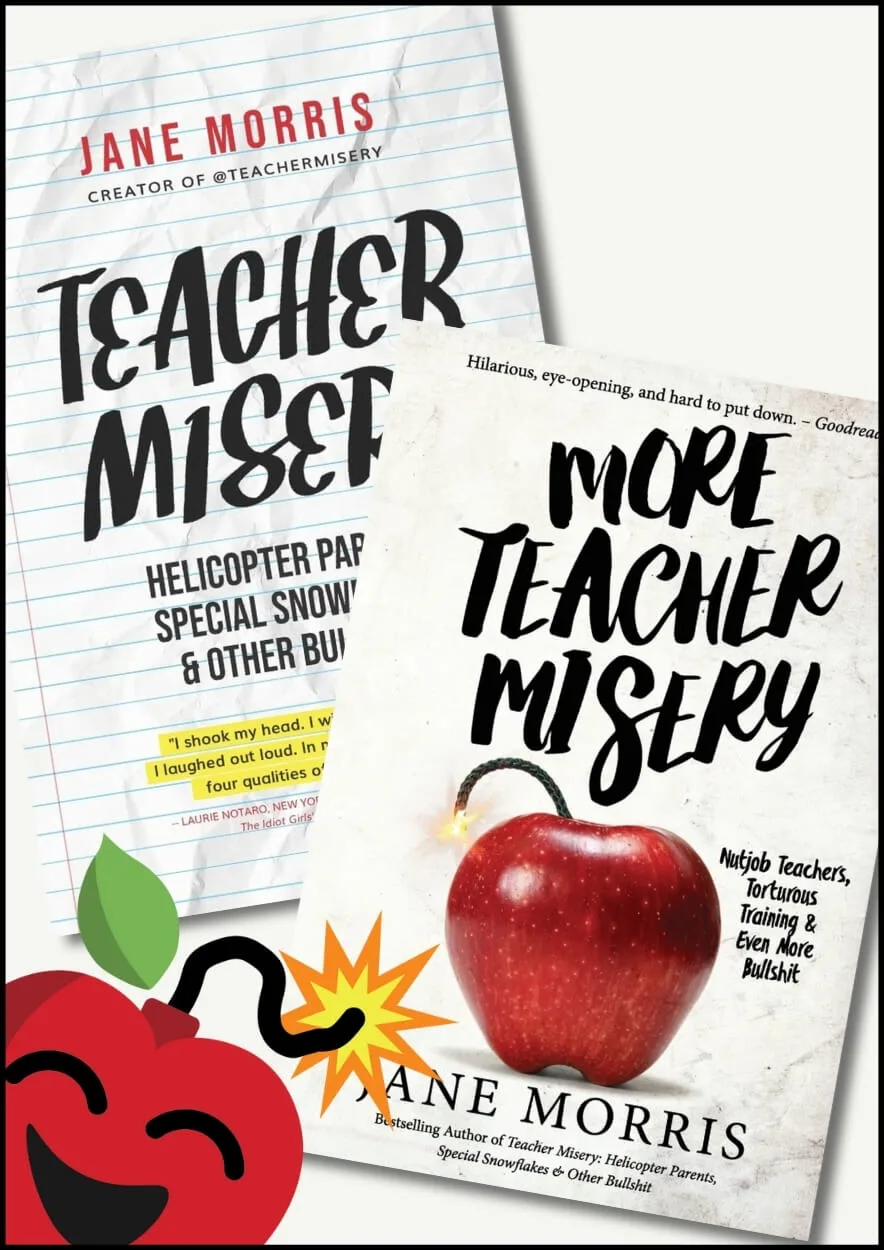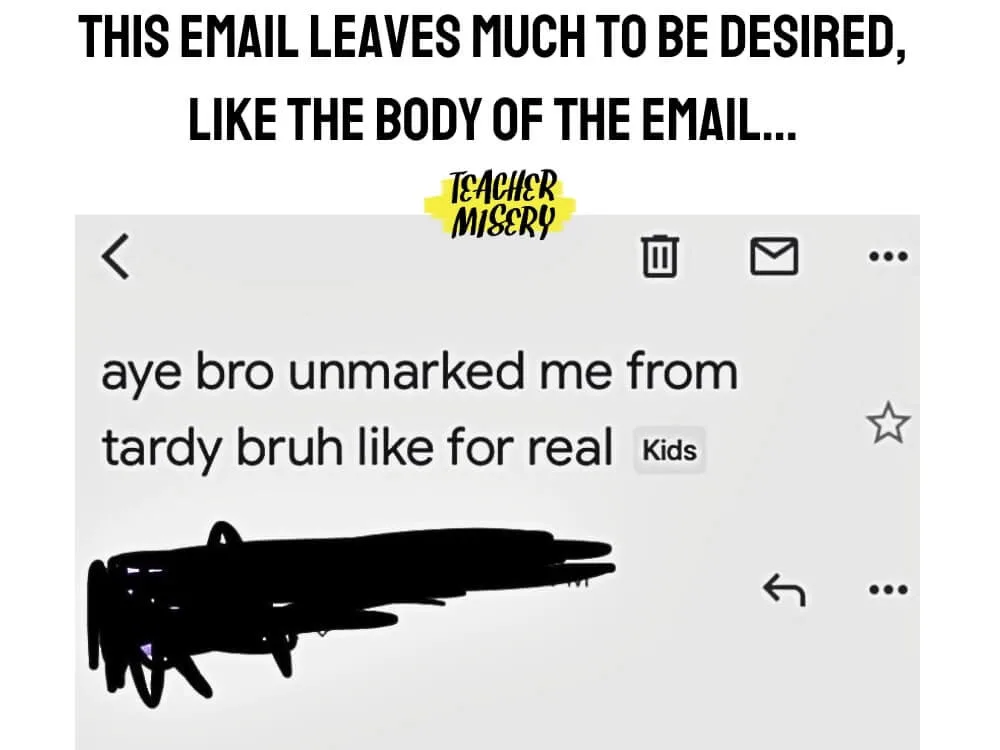Apparently, they don’t teach email etiquette in school because teachers get emails every day from students and parents that are shockingly rude. While I would think that how to email a teacher would be common sense, there are basic aspects of this that many people don’t seem to know, such as starting with a greeting. Instead of saying, “Dear Ms. Teacher,” or even “Hello,” a lot of kids and even parents will jump right into the matter at hand (which is usually a complaint or request) without a greeting or any context on the matter.
I’m Going to Need More Information, Bruh
For example, I once received an email from a student and the only contents were the subject line that said, “My grade,” and the actual email merely said, “bruh.” But at least the student gave a proper closing, which is also something that many people forget to include. After “bruh,” the student wrote “Sincerely” and their name below. So when you consider how to email a teacher, you definitely want to have both a friendly opening and a respectful closing.
Get the Books That Started It All
Before the blog, the podcast, the merch store… there were the best-selling books.
If you like the content on this site, then you’ll LOVE the Teacher Misery books. They’re jam-packed with teaching insanity, ridiculous true stories, and all the commiseration about the profession you’ve come to know, adore, and respect.
Follow the links below to get your copies today!

You Get More Flies with Honey
Now, just because you have a proper greeting and a respectful closing doesn’t mean the content of your email to the teacher is any good. Take this parent email, for example. The parent begins by saying hi and that she hopes the teacher had a wonderful weekend. She closes the email by saying she is really looking forward to hearing back. The problem is that in the body of the email, she says she is speaking on behalf of other mothers about what should and should not be happening in class.
“I just wanted to let you know that I am having a little trouble understanding what you do in your classroom along with some other mothers!” Okay, when we think about how to email a teacher because we are trying to get some kind of positive feedback, implying that the teacher isn’t doing her job and saying everyone agrees is probably not the best way to go about it. Putting all the blame on the teacher for your kid’s failure is probably not the best idea either, even if you truly feel that it is the teacher’s fault. This is just the basics of dealing with people.
You know that saying, “You get more flies with honey,” or however that goes? So saying that no student should be failing with two teachers in the room is not a good idea. It gets even worse when the parent starts telling the teachers what they should and should not do. If you find yourself typing out the words “you should, you need to, you better,” or even worse, “I expect you to,” you better stop what you’re doing and reconsider sending an email to the teacher altogether. Also, if you use as many exclamation points as this parent, it better be for something you are excited about!

Hey, Teacher!
So by now, you should know that you need a greeting in your email, but just any greeting won’t do. Yo, listen lady, aye, or wat up my homie, will not set the right tone for your email. If you start with Dear, Good Morning, Good Afternoon, Good evening, and Mr./Mrs./Ms., followed by their actual last name, you simply can’t go wrong. Referring to them simply as “teacher” in your email will immediately let them know that you see them as some kind of servant or someone who isn’t worth learning the name of. Take this email to a teacher, for example. It’s hard to believe it’s even real!
“Teacher,
This is a cease and desist. Remove immediately the 0 you gave my child and correctly grade her for her efforts.”
Let’s stop right there. Demanding anything of the teacher (or anyone, really) is not going to help persuade the person to want to hear your reasoning. This is just common sense. Also, teachers never want to hear that we gave you a grade. However you choose to see it, we feel that your grade is what you earned, and even if you feel the grade you received does not accurately reflect the effort you put in, accusing us of “giving you” a poor grade suggests that we did this for a personal reason. Sometimes this is true, but being confrontational and accusatory will not help persuade the teacher to change your grade. You might try asking what else you can do to improve next time and saying you tried your best. But if the issue is that you never turned in work in the first place, as is the case in this email, you don’t have much of a leg to stand on.
Asking rude questions such as where the teacher got their teaching certificate, how they obtained their life skills, or how they were hired is also not the best idea. You might want to avoid extreme exaggerations, such as calling the zero you or your child received “an abomination of catastrophic proportions.” Those kinds of labels should be reserved for an atomic bomb, not a report card.
Tony’s Mom Knows How to Email a Teacher
At this point, you might wonder what a respectful email to the teacher could look like! Well, here is an excellent example.
“Hello Ms. Smith,
I hope all is well. This is Tony’s mother. He will not be attending school tomorrow, March 17th, because he peed his pants out of fear of leprechauns during the last two school days. Of course, this is no one’s fault, and kids should be allowed to discuss leprechauns during the week of St. Patrick’s Day. It just seems that Tony has developed a serious phobia of these mythical creatures, and it’s probably in everyone’s best interest if he stays home on the actual holiday. If you wouldn’t mind keeping an eye on him when he returns the day after the holiday, just to make sure he is okay? We appreciate everything you do, and I apologize for asking you to pay extra attention to our son; we are just worried about him.
Thanks again!”
Yes, this was a real email that was sent to a teacher, and the parent handled an unusual situation very well. She had a proper greeting, wished the teacher well, said who she was, explained the situation without blaming anyone, respectfully made her request, and closed with a thank you. Chef’s kiss, Tony’s mom!
Buy Some Merch · Support the Site!
Teacher Misery is by the teachers and for the teachers. Our mission to improve the lives of teachers everywhere.
If you’d like to support the cause, buy yourself (or the burnt-out educator in your life) a gift from our merch store. And, YES, they are all as sarcastic as you’d hope. 😉
Every dollar supports the commiseration!

Keep It Fresh, But Not When You Email Teacher!
Now, you must follow similar rules for students who need to email their teacher. Include a proper greeting (which can only consist of dear or hello) and the teacher’s proper name. “Wat up homie, keep it fresh, what’s crackin’,” etc. simply will not do in this case. Then follow similar rules as parents, such as respectfully requesting something, refraining from accusing them of anything or calling them names, and thanking them for their time. You also want a proper subject line that doesn’t include the entire body of the email or an obnoxious command such as “Change my grade now!” When it comes to trying to get something from your teacher, the more respect and appreciation, the better!

I consider myself very fortunate to be the recipient of copies of outrageous emails and letters that teachers all over the country have received. Many of them confirm the fact that the level of respect that teachers get is about as low as it can go. Parents and students no longer have to say how they feel to a teacher’s face. They merely pound it into their keyboard, press send, and move on with their day. But if the purpose of the email is to get the teacher to help you in some way, you might want to control yourself and use some common sense.

If you enjoyed this article, you would also love this article about the challenging types of parents who show up for conferences, and you would also enjoy my book More Teacher Misery: Nutjob Teachers, Torturous Training & Even More BS.

